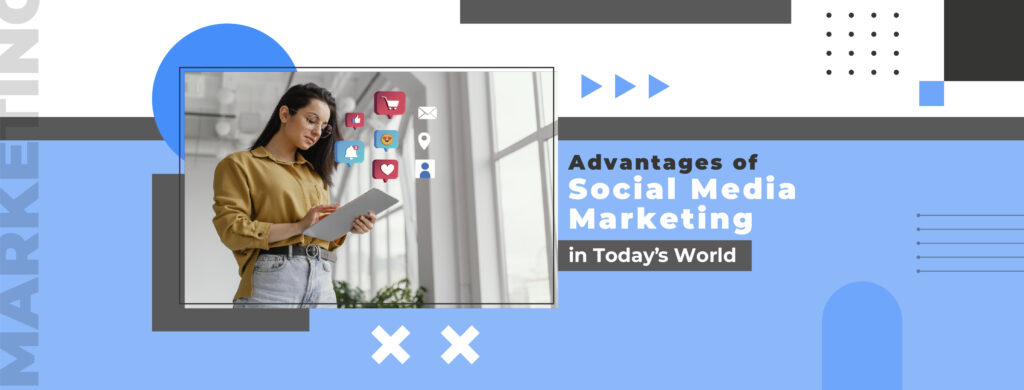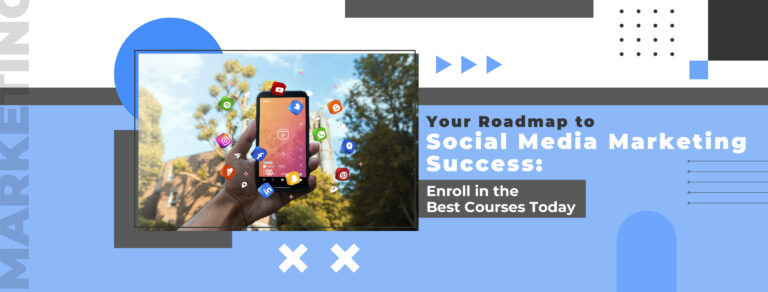
Nowadays, it’s hard to imagine life without social media. With billions of users, platforms like Facebook, Instagram, Twitter and LinkedIn make the internet a lively place for connecting and sharing information. It makes sense that businesses have taken note. Brands of all kinds can use social media marketing (SMM) to their advantage because it gives them a unique mix of reach, engagement and data-driven insights. The advantages of social media marketing for business will be covered in detail in this blog post, along with any potential disadvantages, so you can determine if it’s the appropriate move for your company.
What Is Social Media Marketing?
Understanding the social media marketing meaning is important for companies seeking to use these platforms effectively. The effective use of social media to reach certain business goals is called social media marketing. Among other things, this can include:
- Creating and Sharing Content:
Getting people to notice your brand can be done with interesting posts, useful articles, eye-catching images and interactive content.
- Creating Connections:
Social media makes it easier for people to talk to each other, which helps businesses connect with their customers, solve problems and build trust.
- Community Management:
Contributing to conversations, reacting to messages and building brand communities builds customer loyalty.
- Social Listening:
Businesses can learn about how customers feel, spot trends and change their strategies by keeping an eye on online talks and brand mentions.
- Influencer Marketing:
Working with the right influencers can help your brand’s message reach a lot more people.
- Paid Promotion:
Advertising on social media platforms enables hyper-targeted campaigns to appeal to certain interests and demographics.
How Do Companies Benefit From Social Networking
One of the main benefits of social media marketing is connecting brands with their audiences. Here’s a brief look at the social marketing advantages and disadvantages:
Advantages of Social Marketing
- Enhanced Brand Awareness:
Social media lets you promote your brand, values and products to a large audience. Regular, compelling content may boost brand awareness and make you an industry thought leader.
- Cost-Effectiveness:
Reaching your target audience via social media is cheaper than traditional marketing. Although many channels are free, paid advertising enables tailored campaigns with great ROI.
- Direct Client Engagement:
Social media creates a two-way channel of contact that lets companies talk to their customers directly. You may strengthen relationships by responding to queries, addressing difficulties and tailoring your approach.
- Valuable Customer Insights:
Get a feel for consumer sentiment, track mentions of your brand and more using social media listening tools. This data can improve product development, marketing and customer service.
- Targeted Marketing:
By using their demographics, hobbies and online behaviour, social media sites give you advanced advertising options that let you find and reach your ideal customer. So, your word will get to the right people and your campaigns will have the most impact possible.
- Enhanced Website Traffic and Leads:
Get people to visit your website again by posting useful content and interacting with your followers on social media. This can boost signups, sales and downloads.
- Enhanced Brand Image:
You can take charge of your brand’s image on social media. Resolving consumer issues quickly and openly helps promote trust and a good brand image.
- Building Brand Loyalty:
Social media sites let you get to know your users better on a personal level. By creating a community, responding to comments and providing excellent customer service, you may generate brand loyalty and advocacy.
- Humanizing Your Brand:
You can show the human side of your business on social media. Share behind-the-scenes footage, staff stories and relatable content to make your company more approachable and trustworthy.
- Real-Time Customer Service:
Real-time customer support can be offered via social media channels. This helps you quickly and effectively solve customer concerns, which improves the experience of the customer.
Disadvantages of Social Marketing
Every marketing plan has its flaws and social media marketing is no different. Here is a quick list of the disadvantages of social marketing:
- Time Commitment:
Keeping up with social media requires consistent work and posting new material.
- Unfavourable Feedback:
Negative comments and online criticism tend to flourish on social media. Dealing with these kinds of problems requires a plan.
- Measurement Problems:
Social media analytics can teach you a lot, but it can be hard to figure out how much your social media efforts really cost you.
- Constant Algorithm Changes:
Companies need to adjust their social media marketing tactics all the time because social media platforms are always changing their algorithms.
Conclusion of Social Media Marketing
Today, social media marketing is an important tool for businesses to have in the digital world. It works well for companies of all sizes since it boosts brand recognition, builds relationships and gets results at a reasonable price. Finally, the success of your social media marketing depends on having a clear plan, sticking to it and being able to adjust to how social media is always changing. Businesses can build a strong online footprint and reach their marketing goals by learning what social media marketing does and how to use its pros while minimizing its cons.






